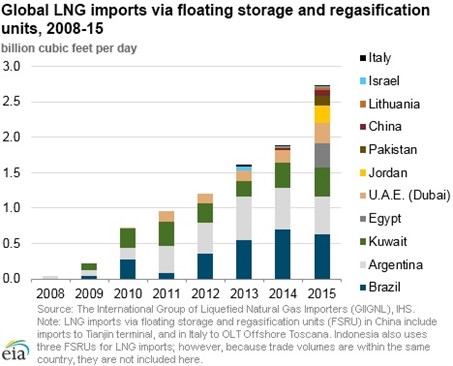EIA: Usage of FSRUs increase 46% in 2015 over 2014 levels

Photo courtesy US Energy Information Administration
Energy Information Administration - Earlier this month, Pakistan announced plans to build infrastructure for a second floating storage and regasification unit (FSRU) to import LNG, doubling its current regasification capacity. Pakistan is one of several countries that experienced strong growth in natural gas demand in recent years, primarily for gas-fired electric generation, and have limited options to import natural gas by pipeline or produce it domestically. FSRU technology allows a flexible, cost-effective, and relatively quick way to import LNG to address supply shortages. In 2015, global imports of LNG using FSRU increased by 46% as compared to 2014, primarily as a result of three new countries that began LNG imports via FSRU—Egypt, Pakistan, and Jordan.
FSRU technology is increasingly used worldwide, particularly in smaller, emerging markets that have either supply shortages or a highly seasonal demand. FSRU typically involves a specialized vessel, which is capable of transporting, storing, and regasifying LNG onboard. Currently, there are 24 operating FSRU vessels: 18 are moored in ports worldwide on a short-term basis and can be relocated if a country's demand requirements change, three are engaged in LNG trade, and three are permanently moored. Seven more FSRUs are currently under construction, with expected delivery dates in 2016-18, according to the International Group of Liquefied Natural Gas Importers (GIIGNL).
Global LNG imports received by FSRU terminals in 2015 amounted to 2.7 Bcfd and accounted for 8% of global LNG imports, according to EIA's calculations based on GIIGNL data. In 2015, FSRUs represented 9% of the global regasification capacity, based on data by the International Gas Union. Three new importers in 2015—Pakistan, Jordan, and Egypt—have collectively imported 0.7 Bcfd, accounting for 27% of the total imports using FSRUs and 85% of the year-on-year increase in FSRU imports. Two more countries are expected to begin imports using FSRUs this year: Ghana and Colombia. In its recently released International Energy Outlook, EIA assumed that in 2017-18, several other countries will add FSRUs, including Uruguay, Chile, Puerto Rico, Bangladesh, India, and Russia, increasing total global FSRU capacity to 13.5 Bcfd.
For the original article, go to: http://www.eia.gov/naturalgas/weekly/archive/2016/06_16/index.cfm

- RWE strengthens partnerships with ADNOC and Masdar to enhance energy security in Germany and Europe
- TotalEnergies and Mozambique announce the full restart of the $20-B Mozambique LNG project
- Venture Global wins LNG arbitration case brought by Spain's Repsol
- Mitsubishi Heavy Industries Compressor acquires Swiss rotating equipment maintenance company AST Turbo AG
- KBR awarded FEED for Coastal Bend LNG project



Comments